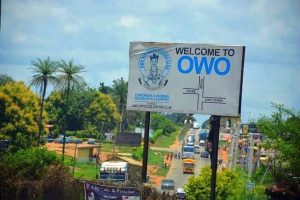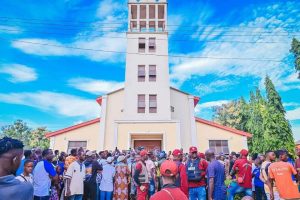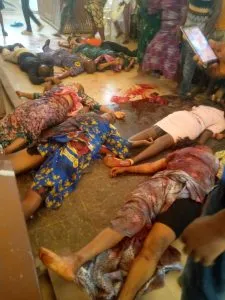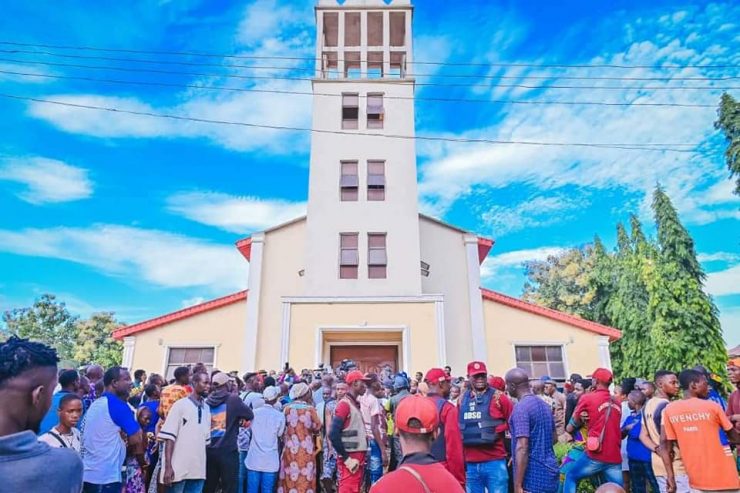Owo, Ondo State, June 5, 2022. A day of bloodshed in a place of worship. All our fears are back. Far away in Europe, I could not sleep, and I lost the capacity to function. The imagery and symbolism are powerful, just too powerful that their significance must be explained to those who do not know. It occurred inside a Catholic Church on a Sunday morning – there is a spiritual (at least religious) dimension to that picture. Imagine such happening on a Friday noon prayer in Kano or Kaduna, where a group, calling itself Christian, goes on a rampage to kill, maim and unleash other mayhems on the people inside the mosque, including capturing the Chef Imam and holding him for ransom. It occurred in the Yoruba town of Ọ̀wọ̀ – one of the most sacred towns of the Yoruba (it is called “Ọ̀wọ̀” because of its sacredness); and remember, Ọlọ́wọ̀ is believed to be the last of the eight sons of Ọ̀rúnmìlà – the Yoruba god of wisdom and divination. It occurred in a Church almost directly facing the palace of the Olowo of Owo; what an insult! It occurred in the town of the seating governor of the state, Governor Akeredolu. It occurred in the home of one of the most revered Yoruba politicians and statesmen, Adekunle Ajaṣin. It occurred right in the center of the town (around Oja Oba). It can’t get any worse than that!

Ọ̀wọ̀!
These are trying times for every peace-loving, industrious, and patriotic Nigerian. Watching our dear nation (our home and pride) degenerate into a theatre of unabating terror—from the enduring insurgency in the north-eastern region to the banditry gradually engulfing the entire nation and the ugly acts of jungle justice—has to be the most harrowing experience we have endured since the civil war of 1967, which claimed the over a million lives and nearly tore the country apart. If we could ascertain the exact number of Nigerians who have lost their lives from the early days of Boko Haram bomb attacks to this period of rampant killings and kidnappings, we might be compelled to rethink the comparative cost of the civil war. In fewer words, scores of Nigerians have died due to nationwide insecurity. The southeast is a major zone of insecurity, with rampant killings and the existence of a “state within a state” that makes its own rules.
The last twelve weeks have been particularly brutal on our collective psyche as a people. Scarcely recovering from the shock of the attack on the Abuja-Kaduna train, which left many dead and many others kidnapped and still languishing in the camp of their terrorist captors, the news came from Sokoto on May 12, 2022, of a student murdered in the most gruesome manner by her classmates for alleged blasphemy. Unknown to many, on that same infamous day, another innocent citizen, 37-year-old Sunday David Imoh, was brutally beaten, killed, and set ablaze in Lekki, Lagos State, because of a disagreement with an Okada rider over transport fare.
While the dust was yet to settle on that incident, a vigilante, Ahmad Usman, was attacked, killed, and also set ablaze in Lugbe, a suburb of Abuja, for refusing to listen to pleas to grant a pass to a trader who had stayed on in the market beyond curfew. His offense was insisting that even if they begged him “in Allah’s name,” he would still effect the arrest. For that, he was branded a blasphemer and brutally murdered. Then there was Sunday’s terror attack at St. Francis Catholic Church, Owo, in Ondo State, where dozens of worshipers—including women and children—were gunned down in cold blood!

Amidst this non-stop terror, our people have tried to hold it together. Decent, hardworking, and law-abiding Nigerians have tried to continue with their daily endeavors despite the terrifying knowledge that, as they leave their houses every morning to seek their daily bread, there is an increasing possibility of being victims of either the kidnapping for ransom schemes, senseless terror attacks, or frequent “jungle justice” actions of angry mobs. However, beneath this misleading calm is a palpable tension that can be felt within the polity, as group relations have notably taken a dive given the assumed ethnic and religious connotations of many of the attacks. Alarmingly, all it would take today for anyone to be butchered in the full glare of the public is a shout of “Thief!”.
Many theories have been developed to explain why the Nigerian state is witnessing such unprecedented cases of terror incidents. Environmental and political arguments have been put forward about the issue of the increasing terror attacks and kidnappings inflicted by the infamous “unknown gunmen” and “Fulani herdsmen.” Some maintain that the herdsmen were not originally the gun-slinging, bloodthirsty terror groups we see today. Rather, they were mainly pastoralists who were forced into kidnapping and banditry, both by the effects of climate change forcing them to leave their traditional locations and the attacks from cattle rustlers who stole their main source of livelihood. Hence, they have resorted to crime only to compensate for this loss. As for the political angle, which also accounts for the existence of “unknown gunmen,” the narrative is that these groups are political thugs and mercenaries hired by desperate politicians to serve their nefarious agendas.
Regarding the growing insecurity in the country, the official government position has remained that these acts of terrorism are committed by unscrupulous elements working to destabilize the country, undermine the government’s efforts, and give its administration a bad reputation. In line with this stance, the state policy for counteraction has mostly comprised ineffectual or limp statements claiming that it identifies with the sufferings of the citizens, meaning that, like the lives of Nigerians, its reputation is also under attack and at risk. The simple truth is: that a government that genuinely cares about the safety and welfare of its people will go beyond offering serial condemnations and assurances that “the perpetrators would be brought to book.” Now, this begs the question, how many perpetrators have ever been brought to book?

The Nigerian government appeared to have taken a more measured stance in its fight against terrorism after the extra-judicial killing of then Boko Haram leader Mohammed Yusuf by state security forces and the clash between the Shia Muslim sect and personnel of the Nigerian Army in Zaria, leading to the killing of many of the Shia members and the incarceration of its leader, Sheik El Zakzaky. This might not be unconnected to the intense scrutiny and criticism both incidences brought on its fight against terrorism. This is not taking anything away from the gallantry and patriotism of members of the country’s security forces—Army, Navy, Air Force, Police, Civil Defence, and other volunteer groups—who have given blood and tears in the long fight against the peddlers of terror. Rather, it is to recall, among other things, their many cries of neglect from the battlefield. We must also remember the many billions pledged to this fight against terrorism and the allegations of financial misappropriation involving politicians and soldiers. These recollections, I dare say, lead to one important question: What can we show for all that commitment, which has cost the nation dearly in terms of human and infrastructural development?
For the average Nigerian citizen trying to navigate the scattered landmines of kidnapping and the menace of “unknown gunmen,” “herdsmen,” and jungle justice, it has become very difficult to put the finger on any advances made in the fight against insecurity, especially as it is daily becoming apparent that the terrorists, formerly located at the infamous Sambisa Forest and other north-eastern locations, have made their way southwards to the north-western, middle-belt, south-western, and the south-eastern regions of the country. Let’s take a moment to also consider the plight of refugees and internally displaced peoples and the number of people still in captivity in bushes and creeks across the country. We will begin to realize how dismally this war against insecurity has been prosecuted.
Today, as witnesses to the unwarranted and horrific murders of Deborah Samuel, Sunday David Imoh, Ahmad Usman, the victims of the Abuja-Kaduna train attack, and those of the Ondo church massacre, we must ask the question: Did they have to die? The answer is a resounding “NO!” Their deaths were preventable. For a moment, let us daydream, not just to momentarily escape the many terrors on our heels but to imagine that we have a responsible government that understands that the constitution does not exist for the sole purpose of ensuring its privileges; one that appreciates that as a constitutional democracy, it is the constitution and not any religious doctrine that is supreme; a government committed to a prosperous future for Nigeria; a government chosen by the people and not by money; a government representative of the people’s interests, and not elite interests. If we had such a government, addressing many of these issues would be faster, and politicians will show sympathy for victims and promote the spirit of orderliness.

Therefore, there is no gainsaying that the criminal elements within the general populace, as well as those from without the country’s borders, have taken advantage of the government’s growing lukewarm approach towards checking criminality in the country to advance their agenda and wreak untold horrors on innocent people. Law-abiding citizens are reduced to moving targets abducted randomly, with little or no intervention from the state, and woe to any citizen whose family cannot come up with the ransom in the case of kidnap. Many have been lost in this way.
Fortunately, the day of reckoning for the country’s political representation is around the corner. This is our opportunity to query the state’s conspiracy of silence. We must ask the right questions and demand satisfactory answers. And we can start by asking why those identified as sponsoring terrorism in Nigeria have not been arrested and brought to justice?
Two: they murdered the innocents. They have murdered our sleep again. I join millions of others in offering words of comfort to the families of every victim of the bloodshed. Drawing from Chapter 4 of the book of Psalms, I pray for every Nigerian who currently lives with the fear of what horrors the next minute could bring:
“Answer me when I call to you, my righteous God.
Give me relief from my distress;
have mercy on me and hear my prayer…
In peace I will lie down and sleep,
for you alone, LORD,
make me dwell in safety.
To all the victims and those of us who suffer along with them, I fortify you further with Psalm 121:5:5.
5 The Lord is thy keeper:
the Lord is thy shade upon thy right hand.
6 The sun shall not smite thee by day,
nor the moon by night.
7 The Lord shall preserve thee from all evil:
he shall preserve thy soul.
8 The Lord shall preserve thy going out and thy coming in
from this time forth, and even for evermore.
May security and safety return to our land!














You must be logged in to post a comment.